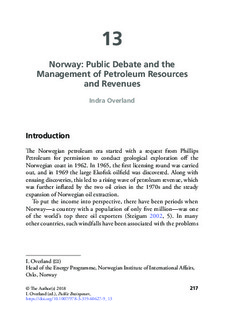| dc.description.abstract | In Russia, civil society engagement with the petroleum sector is surprisingly rich and varied for a country that is ranked low on most democracy-related indicators. This chapter finds that there is a lively and varied public debate, with business associations, research institutes, independent experts, indigenous organizations and the few surviving independent media actively and often competently analysing and commenting on a broad range of issues related to the oil and gas sector. Russians were early users of social media, which occasionally also function as a platform for discussion of petroleum policy issues. However, the real impact of civil society on decision-making and policy formulation in the petroleum sector is not as great as the diversity of actors and discussion might imply. One key reason is the tight government control over mainstream media outlets. The situation for free speech and civil society worsened steadily from around 2004 to 2016. As in neighbouring Kazakhstan, the Russian population puts a high premium on stability over freedom. While a central concern in this book is whether the media and civil society have any influence on the petroleum sector, in Russia the paradoxical situation is that the relationship is often reversed: the gas company Gazprom, rather than another organizational vehicle, is used by the government to control key mass media; and the oil company Yukos played a central role in promoting civil society until its main owner Mikhail Khodorkovskiy was arrested and the company was carved up. Keywords: Russia, natural resources, oil, gas, petroleum governance, civil society, public debate, stability, Gazprom, Yukos, social media, Nemtsov, authoritarianism | nb_NO |

